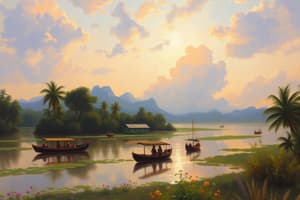Podcast
Questions and Answers
What does the term 'Filipino' refer to?
What does the term 'Filipino' refer to?
- A person from the Philippines or of Philippine descent. (correct)
- A type of traditional Filipino dance.
- An ancient form of government in the Philippines.
- A language spoken in Southeast Asia.
Which of the following is NOT one of the major ethnic groups in the Philippines?
Which of the following is NOT one of the major ethnic groups in the Philippines?
- Malay (correct)
- Visayan
- Cebuano
- Ilocano
What is the primary language that Filipino is based on?
What is the primary language that Filipino is based on?
- Cebuano
- Tagalog (correct)
- Bicolano
- Ilocano
Which of these festivals is notable in Filipino culture?
Which of these festivals is notable in Filipino culture?
What percentage of the population in the Philippines is predominantly Roman Catholic?
What percentage of the population in the Philippines is predominantly Roman Catholic?
What core cultural trait reflects the Filipino value of hospitality?
What core cultural trait reflects the Filipino value of hospitality?
When did the Philippines gain its independence?
When did the Philippines gain its independence?
Which of the following is a current issue facing the Philippines?
Which of the following is a current issue facing the Philippines?
Flashcards are hidden until you start studying
Study Notes
Definition
- Filipino refers to a person from the Philippines or of Philippine descent.
- The term is also used to denote the national language of the Philippines.
Ethnic Groups
- The Philippines is composed of over 100 ethnic groups.
- Major groups include:
- Tagalog
- Cebuano
- Ilocano
- Visayan
- Bicolano
- Mindanaoan
Language
- Filipino is based on Tagalog and incorporates elements from various Philippine languages.
- English is also an official language, widely used in government and education.
Culture
- Rich in traditions, influenced by various cultures including Spanish, American, and indigenous.
- Notable cultural elements:
- Festivals (e.g., Sinulog, Ati-Atihan)
- Cuisine (e.g., adobo, sinigang, lechon)
- Folk dances (e.g., Tinikling, Singkil)
Religion
- Predominantly Roman Catholic (around 80%).
- Other significant religions include Islam (primarily in Mindanao) and various Protestant denominations.
Values
- Strong emphasis on family (kapwa) and community.
- Hospitality (Bayanihan) is a core cultural trait.
- Respect for elders (po and opo) is common.
History
- Colonized by Spain for over 300 years, followed by American rule.
- Gained independence on June 12, 1898, but faced various political challenges.
Current Issues
- Economic disparities and poverty.
- Political instability and challenges with governance.
- Environmental concerns, including natural disasters and climate change effects.
Global Presence
- Significant diaspora, particularly in the U.S., Canada, and the Middle East.
- Contributions to global culture through music, arts, and sports.
Definition
- Filipino can refer to individuals from the Philippines or those of Philippine descent.
- The term also identifies the national language of the Philippines.
Ethnic Groups
- The Philippines comprises over 100 distinct ethnic groups contributing to its cultural diversity.
- Major ethnic groups include:
- Tagalog: Predominant group in the region around Manila.
- Cebuano: Primarily located in the Visayas region.
- Ilocano: Residing mainly in the northern part of Luzon.
- Visayan: Include several groups across the central islands.
- Bicolano: Found in the Bicol Peninsula of Luzon.
- Mindanaoan: Diverse group from the southern island of Mindanao.
Language
- Filipino language is fundamentally based on Tagalog, but integrates vocabulary and influences from various local languages.
- English is an official language of the Philippines, largely utilized in government sectors and educational institutions.
Culture
- Philippine culture is marked by rich traditions, influenced by a combination of Spanish, American, and indigenous heritage.
- Key cultural elements include:
- Festivals: Celebrations such as Sinulog and Ati-Atihan highlight local customs and religious beliefs.
- Cuisine: Popular dishes include adobo (marinated meat), sinigang (sour soup), and lechon (roast pig).
- Folk Dances: Traditional dances like Tinikling (bamboo dance) and Singkil (a dance that tells a story) showcase cultural heritage.
Religion
- Approximately 80% of the population identifies as Roman Catholic, reflecting Spanish colonial influence.
- Other significant religions include Islam, predominantly practiced in Mindanao, and various Protestant denominations.
Values
- The Filipino culture places a strong emphasis on family ties (kapwa) and community connections.
- Hospitality, embodied in the concept of Bayanihan, represents the communal spirit of helping one another.
- Respect for elders is dutifully observed, often expressed through terms of deference like "po" and "opo."
History
- The Philippines experienced over 300 years of Spanish colonization, succeeded by American rule in the early 20th century.
- Achieved independence on June 12, 1898, yet continued to encounter various political challenges post-independence.
Current Issues
- Economic disparities and widespread poverty remain pressing concerns.
- Political instability and governance challenges persist, impacting overall development.
- Environmental issues include vulnerability to natural disasters and the effects of climate change.
Global Presence
- The Filipino diaspora is notable, with significant populations in the U.S., Canada, and the Middle East.
- Contributions to global culture encompass various fields such as music, arts, and sports, showcasing Filipino talent on the world stage.
Studying That Suits You
Use AI to generate personalized quizzes and flashcards to suit your learning preferences.




